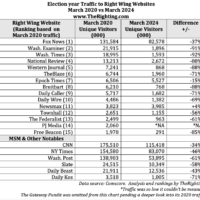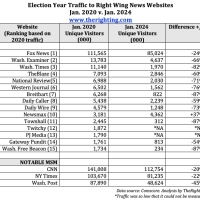
PublicSq Promises Woke-Free Shopping for Conservatives
By Michael Lovito, June 6, 2023
When I spoke with Michael Seifert last week, he was in a celebratory mood. His app PublicSq (pronounced “Public Square”) had rocketed up the Apple App Store charts to become the third-ranked shopping app, and the 14th ranked app overall – higher than mainstream competitors like Amazon and Target. For Seifert, the founder and CEO of PublicSq, this was confirmation that the app’s mission to connect conservative shoppers with “values-aligned” businesses was making serious headway, and that his goal of creating a “parallel economy” was more than just a fringe effort.
“There’s a real hunger for people to support local businesses, to support small businesses in general, to kind of get away from a globalist style of approaching the economy,” Seifert said. “There’s a real hunger to support products that have American interests in mind.”
Seifert hopes that PublicSq can help satiate those hungers. Boycotting a company for adopting a DEI policy or selling Pride-related products is easy – much harder is finding a replacement for a ubiquitous product or retailer like Bud Light or Target. PublicSq is designed to make searching for such an alternative easier, connecting conservative shoppers to online and local retailers who pledge not to support causes and organizations that have drawn the ire of right-wing commentators and consumers.
But Seifert isn’t just interested in splitting the marketplace between liberals and conservatives – instead, he wants to replace it entirely with an economy geared towards bringing about an American “renaissance” built on conservative values. Despite launching just over two years ago, major players on the right have hopped on the PublicSq bandwagon. The company plans to add former Arizona Senate candidate Blake Masters and Nick Ayers, Mike Pence’s former chief of staff, as board members, and the Daily Mail reported that Donald Trump Jr. signed on as an official adviser. Given the realities of modern capitalism, skepticism about whether the brands promoted by PublicSq will ever be able to eclipse their mainstream competitors is probably warranted – but the enthusiasm for the app’s services is impossible to deny.
Born from Boycotts
When discussing his inspiration for founding PublicSq, Seifert is quick to mention corporate actions that he feels alienated conservatives, such as Starbucks’ pledge to match employee donations to Planned Parenthood and Target’s trans-friendly bathroom policy. But Seifert, a Liberty University graduate who just turned 28, says that it was the conservative reaction to a liberal boycott that convinced him something like PublicSq could be viable.
“In 2014, I drove by this Chick-fil-A in St. Louis, Missouri, and I saw a two-hour line out the door,” Seifert said about the chicken sandwich chain that drew progressive ire for its donations to groups that opposed same-sex marriage. “I was so enthralled by that, so I pulled over and Googled what was happening, and I saw that there was a national protest of Chick-fil-A. And the weird thing was there were only like five protestors out front, but there was a two-hour line of consumers. And I remember thinking, whoever can figure out a way to mobilize consumers like that is going to win and win big.’”
Seifert, who previously worked as an associate director at a Christian non-profit and the head of marketing at a real estate investment firm, teamed up with a group of app developers in early 2021 to create a product roadmap for PublicSq and launched the first version of the app in September of that year. Initially limited to promoting businesses in Seifert’s native San Diego County (the company itself is in the midst of relocating from Carlsbad, California, to West Palm Beach, Florida), PublicSq slowly crept eastward and northward, growing from a directory of 100 business with 1,000 users to one with 50,000 business and nearly 800,000 consumer accounts. According to Seifert, the app was initially most popular in deep blue cities like Chicago and Seattle, where the need for conservative shopping options was “so strong.” In the years since, PublicSq’s regional popularity has rounded out, with reddish-purple markets like Dallas, Phoenix, and Nashville becoming providing the bulk of its users.
Online and Local
PublicSq focuses on connecting customers with two different kinds of business. The first are online retailers framed by PublicSq as “alternatives” to mainstream brands that have angered conservatives. One recent promotion on the app encourages users to “ditch” outdoor clothing brand Patagonia, which has been outspoken in their opposition to far-right Republicans, in favor of Choona, who makes similar clothing. Another implores them to shop at Zivah, which sells sunglasses inscribed with a Bible passage, instead of Warby Parker, who pulled their advertisements from conservative websites in 2021. Seifert says that PublicSq plans to launch an e-commerce feature later this year, but for the time being customers can’t make purchases through the app. Instead, they can use it to help them navigate to vendor websites and get access to exclusive discounts.
The other, and arguably more interesting, kind of businesses found on PublicSq are local establishments such as restaurants, pharmacies, and contractors who, after agreeing to adhere to the apps five “core values” (the short version: no pro-abortion or pro-LGBTQ donations, no vaccine mandates, no DEI or ESG policies) and weathering a one-day vetting process, can be viewed on a searchable map of the United States under the “Near Me” tab. The map acts as a rough measure of PublicSq’s reach and popularity, and the results are impressive. Even the most Democratic cities are speckled with PublicSq’s trademark blue squares, to the point where the cities without a high concentration of PublicSq businesses are more notable than those with them.
I asked Seifert if any of the PublicSq aligned businesses, such as the three listed restaurants I found in my left-leaning Brooklyn neighborhood, have expressed any concern that publicly identifying themselves as conservatives could alienate their presumably liberal customers. Ever the optimist, Seifert waived those concerns off, saying that the benefits of being listed on PublicSq outweighed any of the risks.
“We’re giving a real sense of comfort and security to the businesses on the platform that there’s a whole army of people with them,” Seifert said. “It’s a lot harder to cancel over 50,000 people than it is to just cancel one or two.”
“A New Era of American Prosperity”
For the time being, PublicSq makes most of its money by selling ad space and cutting revenue sharing deals with some of the companies it promotes, but Seifert sees a litany of possibilties when it comes to monetizing the conservative shopping movement. In addition to the planned e-commerce features, Seifert has toyed with the notion of opening brick and mortar stores and fulfillment centers, and also floated the idea of using the treasure trove of consumer data harvested by the app to help PublicSq launch its own line of products.
“If you’re a Christian, conservative mom from the Midwest, nobody knows better the products you’re looking for then we do, because we have a search bar that’ll tell us ‘hey, this month, we had 20,000 searchs for X product,” Seifert said. “What we can then do is learn the biggest pain points, find out which products don’t have great values aligned alternatives right now, and then actually create those products and sell them into our marketplace with better margins than the competitors, because we have the customer acquisition model already built in.”
If there’s one thing Seifert and PublicSq have proved to be comfortable with, it’s change. Earlier this year, the company dropped the social media-esque “public forum” feature of the app as well as its job board, which was replaced by an integration with the conservative job search site Red Balloon. The company also recently agreed to a merger with Colombier Acquisition Corp., a move that will allow the company to go public and, in Seifert’s eyes, further its mission of revitalizing American business.
“Do we want to go with the ways of the last two decades and sell our souls at the altar of cheap convenience and petty politics? Or do we want to prioritize bringing manufacturing back to our shores and supporting small businesses that stand for the values that made this country special, and see a new era of American prosperity?” Seifert said. “I believe, fundamentally, that the response of the majority of Americans will be that they want the latter.”
Michael Lovito is a Brooklyn-based reporter and critic whose work has appeared in Salon, Brooklyn Magazine, Pavement Pieces, and The District. He also serves as editor-in-chief of the politics and pop culture website The Postrider. @MLovito
Interested in more news about right-wing media curated especially for mainstream audiences? Subscribe to our free daily newsletter.
PublicSq is designed to connect conservative shoppers to online and local retailers who pledge not to support causes and organizations that have drawn the ire of right-wing commentators and consumers. (Image: Pixabay)
























